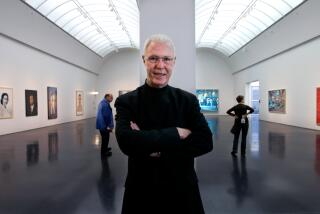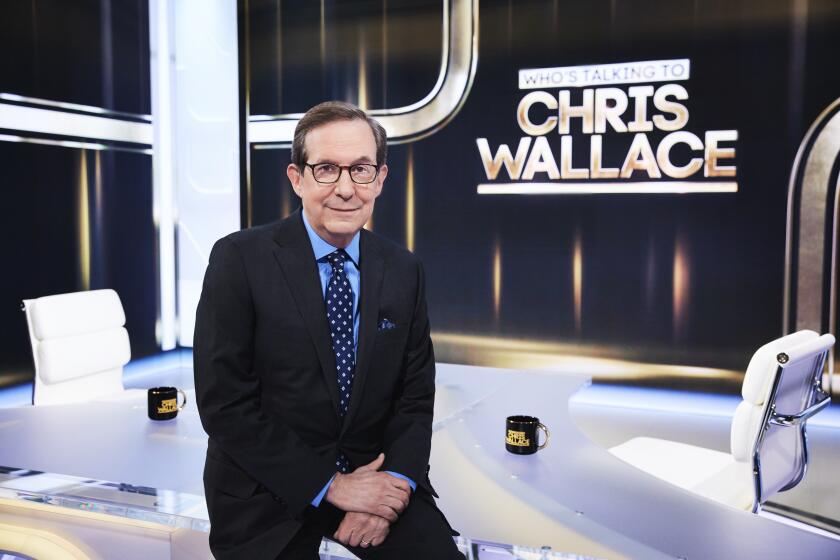SETTING THE STAGE FOR THE ARTS FEST : In Creating Such a Production, Says Director Fitzpatrick, ‘There Has to Be Some Vision and a Series of Choices’ : 3 1/2-WEEK EVENT, COSTING $6 MILLION, DUE TO OPEN SEPT. 3
Robert Fitzpatrick is calling Europe a lot these days from his black BMW--that is, when he isn’t there himself. “I’ll be talking to Peter Brook in Paris, and suddenly the line fades and I have to tell him it’s because I’ve just come onto the Mulholland Pass. . . .”
Fitzpatrick, president of CalArts, director of the 1984 Olympic Arts Festival and director of its successor, this September’s Los Angeles Festival, grinned. Brook is the world-famous British theater director, and Los Angeles’ best-known impresario takes pleasure in being in, as well as in bringing in, such company.
To mount Los Angeles’ second international arts festival in three years, Fitzpatrick said he has traveled nine or 10 times to Europe, Asia, Africa and Australia. He expects to go abroad two or three more times this year, partly to prospect for the 1989 festival. This year’s festival will run from Sept. 3 to 27, featuring about 40 theater, dance and music companies and productions, including Brook’s nine-hour “Mahabharata.”
A smidgen of controversy arose last week when the Herald Examiner questioned whether the festival organization was violating its contract with the city’s Community Redevelopment Agency by failing to include visual arts exhibitions.
But agency administrator John Tuite told The Times that he does not believe there has been any violation of contract, suggesting that there would be a balance of events through successor festivals. With the opening of the Museum of Contemporary Art, he said, “it’s been a marvelous year” for the visual arts.
Fitzpatrick pointed out that this is “ not the Olympic Arts Festival, (when) we tried to cover the entire world. (Now) we’re trying to rotate artistic and geographical programs.”
The 3 1/2-week festival has a $6-million budget, considerably leaner than the 10-week, $10-million (which grew to $11.5-million) Olympic operation. Housed at the refurbished Embassy Hotel downtown, the staff consists of 14 full-time employees (including Fitzpatrick’s driver/assistant) and will expand to about 500 during the festival weeks.
The vision for this festival, as for the Olympic event before it, belongs to the peripatetic 46-year-old Fitzpatrick--part academician, part pitchman. It is his taste that prevails.
“Creating a festival is no different from staging a play or conducting an orchestra,” Fitzpatrick said. “There has to be some vision and a series of choices--and lots of talking and listening and looking.”
About 90% of the festival, representing about a dozen nations, is in place, but Fitzpatrick is not telling all, awaiting the full-dress announcement of program and ticket sales next month. “I have to save something ,” he said.
“Unlike European festivals that always want to have some kind of theme, I don’t like that notion and trying to force everything to fit it. This is primarily a sense of discovery: people who have provoked me into seeing or hearing or understanding in a way that I hadn’t before.
“I almost never issue a contract immediately. I want to wait. If, after I’ve seen a work, two or three months later it is continuing to sort of percolate, it continues to come back and, if it still haunts me, troubles me, then I think, Ah, yes!
“There’s no reason for a festival to do easy pieces,” Fitzpatrick added, “no reason to do what’s readily available. We’re doing less music than theater and dance. And the reason is very simply that between the extraordinary range of artists that are brought by the Los Angeles Philharmonic, and all the things that are done by the Ambassador (Auditorium, in Pasadena) and other organizations in town, we have an incredible range. We don’t get that access in theater and dance.”
Meanwhile, he said, the festival is helping set up a parallel Fringe Festival for local, “less established, but not necessarily less good” artists. Local components in the main festival also include the Lewitzky Dance Company and the Los Angeles Music Center Opera Assn.
Ingmar Bergman is coming to the main festival to direct a production of August Strindberg’s “Miss Julie” in Swedish. But Fitzpatrick insisted that language will not be a problem, just as it wasn’t during the Olympic festival.
“Besides the incredibly articulate direction and splendid actors, you have a use of lighting in that production which is so central,” Fitzpatrick said. “The lighting is almost like an actor. From the very beginning, Bergman defined the kind of quality of light that transfuses the production.
“Most of it is backlit, theoretically through a garden. The whole time of day changes, and the whole mood of the play changes. Whether or not the audience recognizes it, when they see the play they will see a director who has used lighting the way that few, if any, other directors in the world have used it.”
Fitzpatrick was even more effusive about the “Mahabharata”--being billed as the North American English-language premiere. The production will be co-produced with the Brooklyn Academy of Music; Los Angeles gets it first.
“If I had to see one play of the last half of the 20th Century,” Fitzpatrick said, “it would be the ‘Mahabharata.’ I first saw it at Avignon (Festival) when it opened in 1985. I have to tell you, there hasn’t been a single day since I have seen it when some part of it doesn’t come back to me in some way, unbidden. I never saw anything like it. It is really the story of the human race . . . patriarchal struggles, war and peace, children and death.”
Los Angeles audiences will get to see the biblical-style epic, based on old Sanskrit texts, at the refurbished Raleigh Studios in Hollywood, which has a 45-foot high stage. The play can be seen in a noon-to-midnight marathon or on three separate nights. The cost is $30 per ticket per night, or $90 for the entire play.
Among the dozen dance companies Fitzpatrick is bringing are Michael Clark & Co. from Great Britain and three French companies: Compagnie Maguy Marin (Marin’s Company), Monnier-Duroure (Mathilde Monnier and Jean-Francois Duroire)--”French critics have referred to them as the new Ginger Rogers and Fred Astaire,” he said--and the Lyon Opera Ballet in a piece, “Cinderella,” choreographed by Marin.
“Although we’ve got a lot of dance in California,” Fitzpatrick said, “it’s still governed by American dance . . . but there are great dance traditions that we have little or no access to.
“France, which 15 years ago had no modern dance to speak of, now has become one of the liveliest, if not the hottest, point country for contemporary dance--in part, because their Ministry of Culture for the last eight years has given major subsidies to young choreographers to create new work. . . .
“Maguy Marin is, in my judgment, the equal of Pina Bausch,” he said, referring to the West German dancer whose troupe opened the Olympic Arts Festival. “Like Pina, Maguy’s work uses a theater element very, very strongly in speech and song. It’s not as bleak or as dark a vision, but it’s just as provocative. The subtext of it turns out to be a commentary on sexuality, in some cases on a gender assignment of dance steps.
“It’s no accident that (when) you look at that poster of Michael Clark,” Fitzpatrick said, pointing with pride to his wall, “the choreographer is wearing a tutu. . . .
“The dance companies that are coming, all of them are testing the boundaries of dance. There is a certain wit, sometimes tender, sometimes quite savage. There’s a lot of nudity in the dance, but it’s beautifully used.
“The opening of Marin’s piece ‘Babel-Babel,’ a huge stage has been covered with grass, there is a Mahler song the dancers have been using and the whole body of the dancers are naked on stage. Generally, I find nudity in dance inappropriate, done for glitz or staging. In Maguy’s case, there is a kind of primal innocence.”
In music, Fitzpatrick expects about a dozen events--half of them built around John Cage--”the grandfather of the avant-garde, a composer primarily, but also a visual artist.” There will be six major events around Cage and two jazz events.
Asked whether there is sufficient audience for the avant-garde here, Fitzpatrick recalled the Olympic festival.
“We saw very clearly, the thing that startled everybody, we did literally have people lining up at 4 o’clock in the morning for the Theatre du Soleil--for Shakespeare, Japanese-style in French. The audiences are not afraid.”
Meanwhile, Fitzpatrick has lost another cultural battle with the Soviet Union over the same company. During the Olympics he tried to bring the Rustavelli Theatre from Soviet Georgia.
“Two days before I was to get on a plane and go sign the final contracts, after having negotiated everything with the Russians, including the fact that we would fill the first 12 rows of the theater with friends to make sure there were no disruptions, just as I was packing my bags I was called and told my visa was canceled,” he said. “And that was the signal for what came later with the sports.”
In November, 1985, at the time of the signing of the cultural affairs agreements between the United States and the Soviet Union in Geneva, he tried again, with the assistance of industrialist Armand Hammer, and learned from a senior U.S. Embassy official that it was again nyet. Later the Soviets told Fitzpatrick he could have any company but the Rustavelli.
Last month, he found out from a knowledgeable American friend that “ ‘the Russians are going to stick to their guns,’ but if I was willing to come back and choose another company . . .”
Fitzpatrick wanted the Rustavelli to perform “Richard III,” “King Lear” and Bertolt Brecht’s “The Caucasian Chalk Circle.” He believes the reason for the Soviet attitude is that “Rustavelli is Georgian, not Russian, and it would be performing Shakespeare and Bertolt Brecht as opposed to patriotic Russian operas. . . . If ever an artistic director allows artistic selection or repertory selection to be made by a foreign government, the integrity of the whole festival collapses.”
Los Angeles Festival will open in Little Tokyo with Cirque du Soleil from Quebec--a circus. The Cirque du Soleil and “Mahabharata” will run throughout the festival.
Fitzpatrick said he made the decision to open the festival with the circus during the party opening the Orange County Performing Arts Center. “I was offended by the lavishness. . . .
“It’s mime and acrobats and sound, as opposed to spoken text,” Fitzpatrick said of Cirque. “It is accessible. Circus is something that exists in almost every culture, and in a city like Los Angeles, which has at various counts 87 and 93 different languages and cultures represented, it is the one thing everyone will feel totally at home with.
“When I mentioned to Europeans . . . that I was going to open with a circus, their eyebrows got arched: ‘An international arts festival with a circus?’ ”
Yes . “It’s funny, it’s fabulously good, and it de-terrorizes the public for everything that’s to come.”
More to Read
The biggest entertainment stories
Get our big stories about Hollywood, film, television, music, arts, culture and more right in your inbox as soon as they publish.
You may occasionally receive promotional content from the Los Angeles Times.










